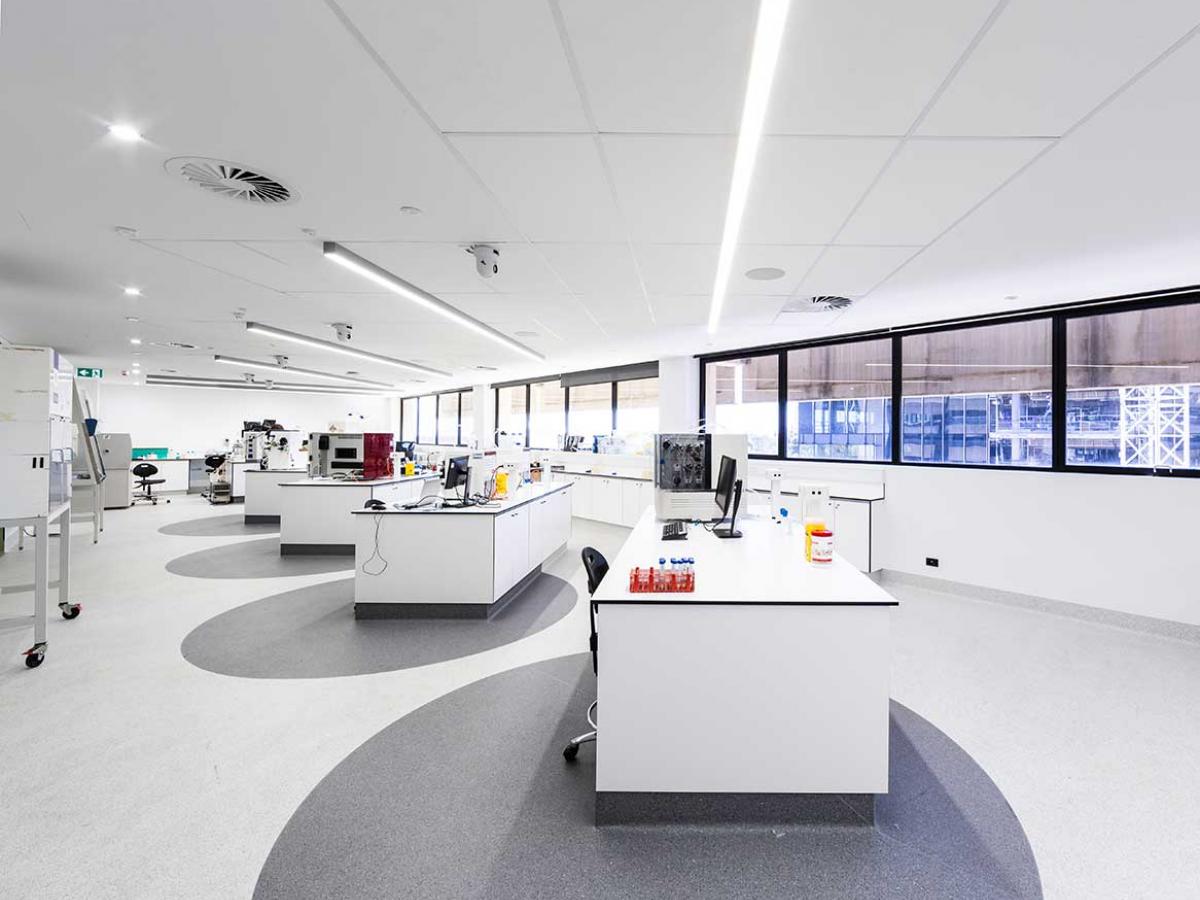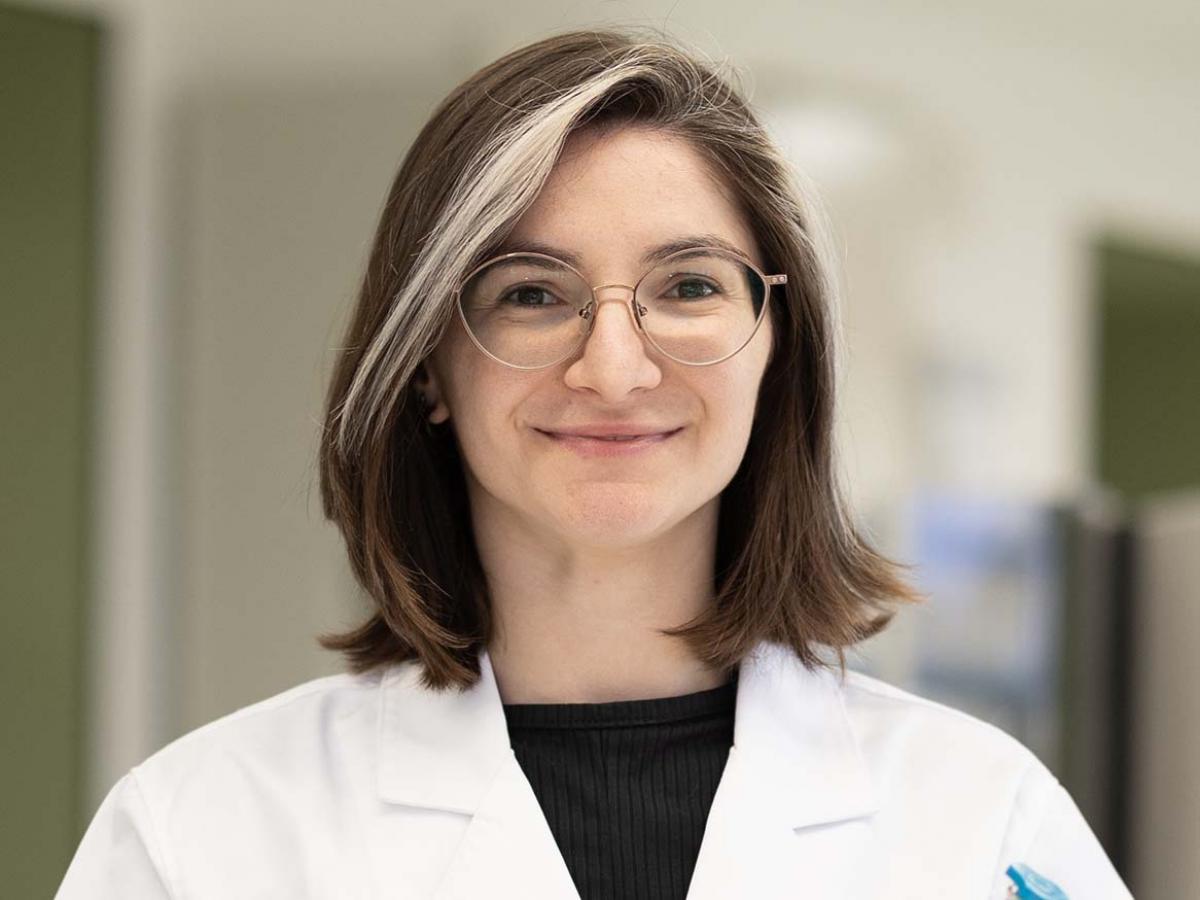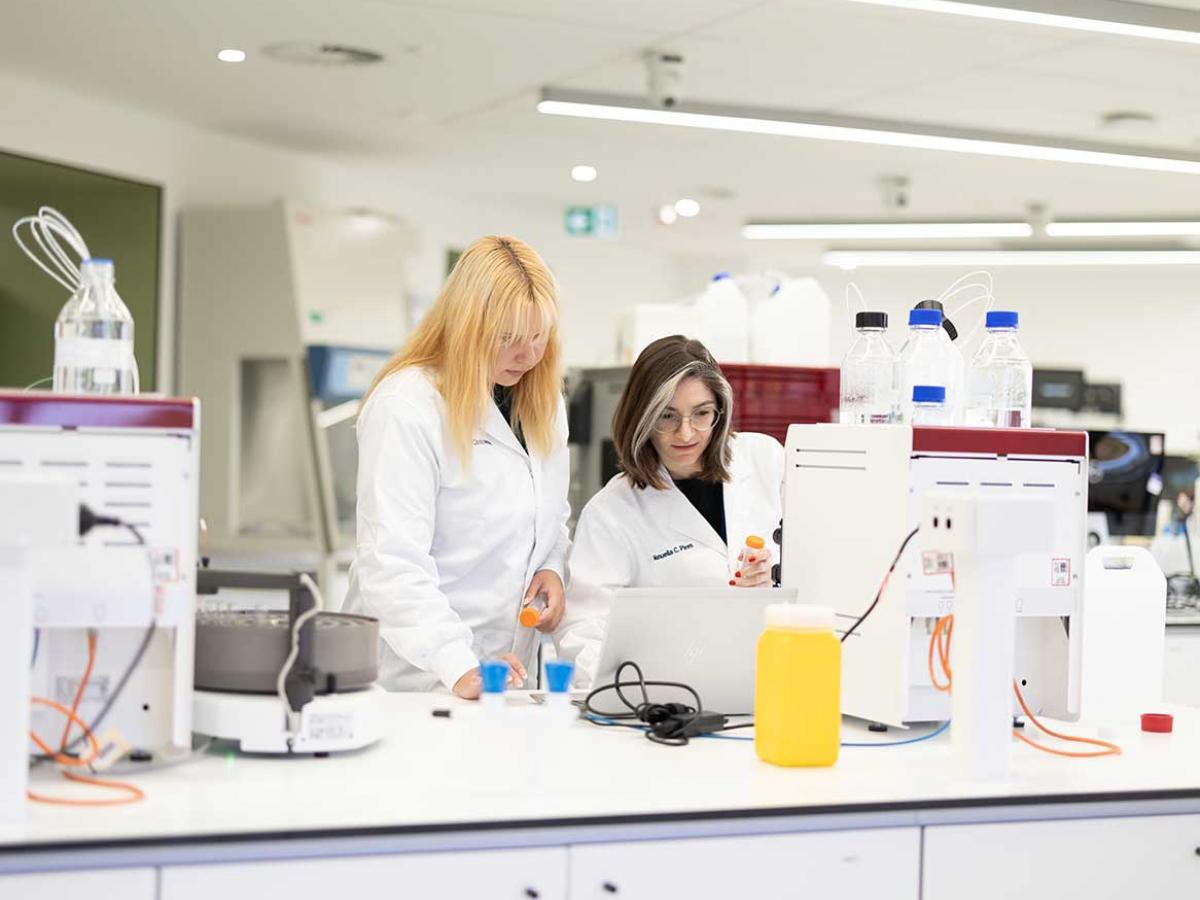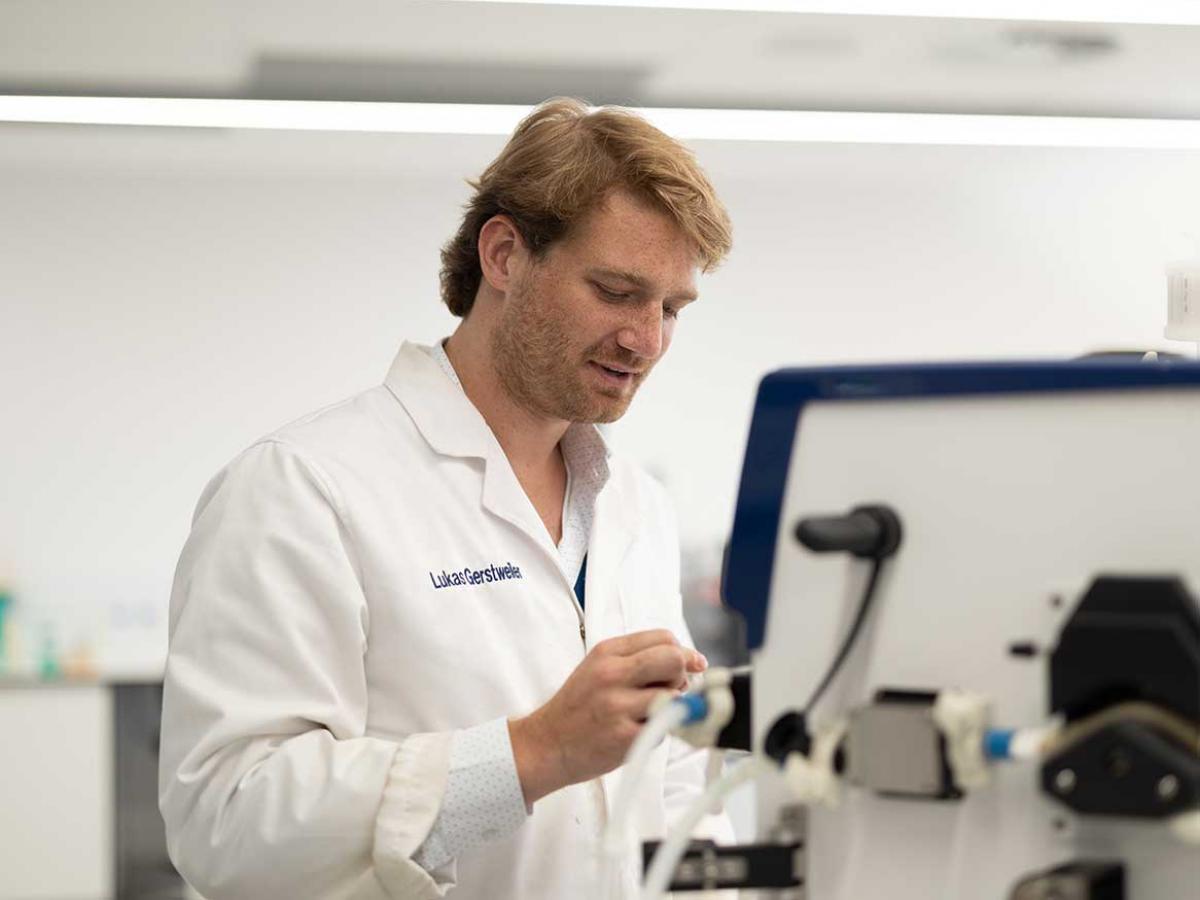Biomanufacturing Research Group
Our research group works with the newest technologies available to deliver more efficient, rapid, and cost-effective bio-derived products such as vaccines, mRNA, purification devices, and recombinant proteins.

From the laboratory bench within the University of Adelaide to industry-scale operations in partners’ facilities, the Biomanufacturing Research Group embraces the challenge of improving societal health.
About us
The Biomanufacturing Research Group specialises in manufacturing biopharmaceuticals, vaccines, and mRNA therapeutics, with a focus on purification and downstream processing. Collaborating with a range of industrial partners, we drive innovation and optimise production processes. Our mission is to advance biomanufacturing, turning scientific discoveries into life-saving therapies and vaccines. The group is led by Dr Lukas Gerstweiler and Dr Sha Liu.
-
Lead researchers

Dr. Lukas Gerstweiler
lukas.gerstweiler@adelaide.edu.au
Dr. Lukas Gerstweiler's Researcher ProfileDr Lukas Gerstweiler is the founder and leader of the Biomanufacturing Research Group. His research focuses on developing advanced bioprocessing strategies to enable the next generation of biopharmaceuticals.
- Driving innovation in continuous bioprocessing to make biologics production more efficient and scalable.
- Developing and applying virus-like particles (VLPs) as versatile platforms for vaccines and gene therapies.
- Advancing chromatography and separation technologies to improve purification efficiency and product quality.
- Applying process modelling and optimisation to accelerate bioprocess design and control.
Recognised as one of South Australia’s 40 Under 40 for his contributions to industry-relevant research, Dr Gerstweiler is building a team at the forefront of biomanufacturing innovation, bridging fundamental science with industrial application.

Dr. Sha Liu
sha.liu@adelaide.edu.au
Dr. Sha Liu's Researcher ProfileDr Sha Liu is a biomedical innovator whose research harnesses bacteriophages and mRNA technologies to develop smarter therapies for some of the world’s most pressing health challenges, including drug-resistant infections and cancer.
- Re-imagining vaccines and mRNA therapeutics to make them more precise, scalable, and effective.
- Advancing phage therapy as a viable alternative to antibiotics in the fight against superbugs.
- Engineering phage-based delivery systems to target therapeutic molecules directly to diseased cells.
- Transforming phage biomanufacturing for cost-effective, clinical-ready production.
By bridging cutting-edge biotechnology with real-world medicine, Dr Liu is building a pipeline of next-generation therapies that could redefine how we treat infections and cancer—while positioning South Australia at the forefront of global health innovation.
-
Current PhD students
Comparative Analysis of VLP and LNP-Based Delivery System

Primary investigator:
Mr Xiaoyan Wang
xiaoyan.wang@adelaide.edu.au
Mr Xiaoyan Wang's Researcher ProfileProject abstract:
Delivery of nucleic acids through nucleic acid delivery vehicles for the treatment of tumours is one of the current emerging strategies for tumour therapy. Lipid nanoparticles offer improved in vivo gene biodistribution and pharmacokinetic profiles, rendering them a favourable approach for clinical trials. Concurrently, virus-like particles, in addition to the vaccine properties they possess, are gradually being recognised for their special properties as gene carriers due to their unique nanostructures. However, applied research in the use of virus-like particles as vectors for tumour therapy is still relatively limited compared to the research into virus-like particles as vaccines. To address these challenges, this project aims to investigate RNA-loaded virus-like particles as a potential nucleic acid delivery system for RNA therapy and cancer treatments. The project starts with developing efficient methods for packaging RNA into virus-like particles. Following this, the properties of virus-like particles loaded with mRNAs, such as stability and stiffness are explored. Then, cell uptake and cargo release, transfection, and translation efficiency of the virus-like particles and lipid nanoparticles are systemically explored. Also, we investigate and compare immunogenicity between lipid nanoparticles encapsulating an immune adjuvant and virus-like particles, intending to enhance the immune response in cancer treatment.
Next-generation biomanufacturing: yeast-based continuous production of low-cost single-domain antibodies

Primary investigator:
Mr Yannis Karavias
yannis.karavias@adelaide.edu.au
Mr Yannis Karavias' Researcher ProfileProject abstract:
Biopharmaceuticals are continuously increasing their share of the pharmaceutical market. They can target difficult emerging diseases like cancer specifically. The downside is the tremendous cost associated with biopharmaceuticals like monoclonal antibodies. Changing from batch-wise production to continuous manufacturing can lower production costs significantly. However, continuous processing has mainly focused on mammalian cell cultures. Next-generation biomanufacturing using alternative hosts offers additional cost savings. Therefore, yeast cells are back in focus, due to their favourable characteristics for cost-efficient manufacturing. In this project, a continuous platform process with yeast cells is developed to produce single-domain antibodies as an alternative to mammalian production processes.
Polysaccharide-based double-grid structure pore-size-adjustable materials

Primary investigator:
Ms Manuella Cazelato Pires
manuella.cazelatopires@adelaide.edu.au
Ms Manuella Cazelato Pires' Researcher ProfileProject abstract:
Developing novel copolymers with double grid / complex lattice structures is the frontier of research direction in materials science today. The aim is to develop various high-performance functional materials based on accessible materials such as polysaccharides, and filamentous proteins, as well as efficient and low-cost solutions to critical problems that are being addressed by industry today, such as low-cost protein purification, and screening of high-value minerals (like lithium and industrial gases). Will also allow the development of cutting-edge high-performance materials for purification purposes, as well as have access to the development of other ultra-high-strength organic materials. The expression of various proteins from functional enzymes to small peptides, from laboratory reaction scale to industrial pilot production scale, will be applied post a purification method designed.
Investigating mechanistic and structural requirements for the formation of unwanted byproducts during in-vitro transcription

Primary investigator:
Ms Cinderella Nowak
cinderella.nowak@adelaide.edu.au
Ms Cinderella Nowak's Researcher ProfileProject abstract:
mRNA technology has come into focus as a promising alternative to conventional therapies, such as vaccines against infectious diseases but also against various types of cancer.
However, there are also challenges mRNA manufacturing must overcome, particularly impurities, such as immunogenic mRNA byproducts, which cause side-effects in the patient’s body and pose a time- and cost-intensive challenge for downstream processes.
These byproducts are formed by the T7 RNA polymerase, an enzyme that synthesizes mRNA during the mRNA production phase, the in-vitro transcription. After all, the exact mechanisms of how and why they are being formed are not yet well understood.
Therefore, an optimized manufacturing process is necessary that results in the best possible mRNA quality to ensure the highest levels of safety and efficiency, as fast and less costly as
possible.This is what this project aims to achieve. By using different molecular biological and chromatographical methods the requirements for the formation of these byproducts should be fully understood. In addition, the analytical approaches for detecting mRNA impurities should be optimized so that their formation can be monitored in real-time.
Integrated Small-Scale Manufacturing of mRNA therapeutics

Primary investigator:
Mr Federico Moreno Sibaja
federico.morenosibaja@adelaide.edu.au
Mr Federico Moreno Sibaja's Researcher ProfileProject abstract:
Recently, mRNA-based therapies and vaccines have been revolutionizing the pharmaceutical industry by providing unprecedented opportunities for the replacement of conventional therapies, due to features such as rapid vaccine development and precision medicine applications. However, there are several manufacturing challenges in the downstream processing, mainly mRNA instability and impurities, such as byproducts generated during In vitro transcription reaction, which are major bottlenecks for purification strategies. Therefore, effective, highly selective and rapid purification is required. Though chromatography is currently employed for mRNA purification, it faces challenges due to properties similarities between mRNA and nucleic acid byproducts. The aim of this work is the design, development, and optimization of chromatographic chips for mRNA therapeutics manufacturing.
-
Former members
Molecular Design and Stability Study of Self-assembled Chimeric Protein Nanoparticle Vaccine

Primary investigator:
Ms Hong Luo
Connect with Hung Luo via LinkedInProject abstract:
Self-assembled protein carrier vaccines are considered a safe and effective type of vaccine, however, it is found in research practice that the inserted heterologous epitopes would often have a great impact on the assembly, stability, and other properties of the chimeric proteins, leading to failure in designing or difficulties in the downstream process. This study aims to conduct in-depth investigations on the influence of epitopes and insertion sites on chimeric proteins by experiments and molecular dynamics simulations (MDS), to guide more efficient and successful design of self-assembled protein carrier vaccines.

Current research and collaboration
We aim to solve real-world problems with a measurable impact and are actively cooperating and seeking industry partners and collaborators for research projects on biomanufacturing. Our main areas of research and current research projects include:
-
Virus-Like Particles and In-Vitro Loaded Viral Vector
Our group develops virus-like particles (VLPs) and in vitro–loaded viral vectors as low-cost, next-generation platforms for vaccines and gene therapies. We focus on efficient processing and purification of VLPs, alongside innovative methods for in vitro assembly and nucleic acid loading. By packaging DNA and mRNA directly into VLPs outside of cells, we aim to create scalable, flexible, and ultra-affordable viral vectors that can transform the accessibility of advanced therapeutics.
-
Continuous Biomanufacturing and Process Intensification
Our research advances yeast-based fully integrated continuous biomanufacturing platforms that streamline the production of recombinant proteins and complex biologics. By coupling upstream fermentation with advanced downstream operations, we develop intensified workflows that enhance productivity, consistency, and scalability. A particular focus lies on multi-column chromatography and periodic counter-current chromatography (PCC), enabling higher resin utilisation, reduced footprint, and robust, cost-effective purification. These innovations aim to set new standards in efficiency and reliability for next-generation bioprocessing.
-
Downstream Processing and Chromatography Innovations
We are developing the next generation of downstream technologies to enable efficient and scalable purification of complex biologics. Our work includes designing new backbone materials for chromatographic resins, advancing mechanistic modelling to guide process development, and performing in-depth column and resin characterisation. With a particular emphasis on the purification of large biomolecules, our research integrates fundamental understanding with practical innovation to deliver more robust, efficient, and economical bioprocessing solutions.
-
mRNA Manufacturing
Our research focuses on advancing purification strategies for mRNA, optimising in vitro transcription (IVT) reactions, and developing small-scale integrated manufacturing platforms. By combining process innovation with scalable design, we aim to establish robust, cost-effective methods for producing high-quality mRNA, paving the way for more accessible vaccines and therapeutics.

Engage with us
Do you need help with biomanufacturing? Whether you’re exploring an industry partnership, seeking specialist consultation, or have general research enquiries, we’d be glad to connect. Please contact our lead researcher, Dr Lukas Gerstweiler.
Honours/Masters/PhD opportunities
Please send an expression-of-interest (EOI) to Dr Lukas Gerstweiler to discuss potential Honours/Masters and currently available PhD projects.
We are actively recruiting PhD students in:
- Continuous chromatography and biomanufacturing
- Mechanistic modelling & model-based process control
- In vitro–loaded viral vectors
- Chromatographic resin development
Include a brief CV and a short statement of your research interests with your EOI.
